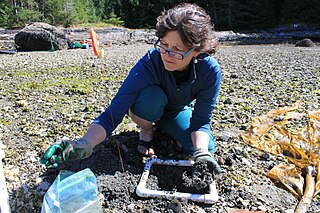Related Research Articles

Camassia is a genus of plants in the asparagus family native to North America. Common names include camas, quamash, Indian hyacinth, camash, and wild hyacinth.

Ethnobiology is the multidisciplinary field of study of relationships among peoples, biota, and environments integrating many perspectives, from the social, biological, and medical sciences; along with application to conservation and sustainable development. The diversity of perspectives in ethnobiology allows for examining complex, dynamic interactions between human and natural systems.

Marion Nestle is an American molecular biologist, nutritionist, and public health advocate. She is the Paulette Goddard Professor of Nutrition, Food Studies, and Public Health Emerita at New York University. Her research examines scientific and socioeconomic influences on food choice, obesity, and food safety, emphasizing the role of food marketing.
Darrell Addison Posey was an American anthropologist and biologist who vitalized the study of traditional knowledge of indigenous and folk populations in Brazil and other countries. He called his approach ethnobiology and combined research with respect for other cultures, especially indigenous intellectual property rights.

William Balée is a professor of anthropology at Tulane University in New Orleans, Louisiana.

Nancy Jean Turner is a Canadian ethnobiologist, originally qualified in botany, who has done extensive research work with the indigenous peoples of British Columbia, the results of which she has documented in a number of books and numerous articles.
Deborah M. Pearsall is an American archaeologist who specializes in paleoethnobotany. She maintains an online phytolith database. She is a full professor in the Department of Anthropology at the University of Missouri in Columbia, Missouri, where she first began working in 1978.

Mary Rita Cooke Greenwood is an American academic and nutritionist.
Nina Lilian Etkin was an American anthropologist and biologist. Etkin was noted for her work in medical anthropology, ethnobiology, and ethnopharmacology. She studied the relation between food and health for over thirty years. Her work involved complementary and alternative medicines for prevention and treatment in Hawai‘i; the use of ethnomedicines in Indonesia; and health issues in Nigeria. She won numerous grants and awards from national and international agencies and published several books as well as over 80 professional articles in peer reviewed journals.

Blue corn is a group of several closely related varieties of flint corn grown in Mexico, the Southwestern United States, and the Southeastern United States. It is one of the main types of corn used for the traditional Southern and Central Mexican food known as tlacoyo.
Patricia D. Daniels is an American engineering educator known for her work on educational accreditation. She is a professor emerita of electrical and computer engineering at Seattle University, and an affiliate professor of electrical and computer engineering at the University of Washington.
Rhian Merry Touyz Koppel is a Canadian medical researcher. She is currently serving as the Executive Director and Chief Scientific Officer of the Research Institute of the McGill University Health Centre in Montreal, Canada, since 2021. A clinician scientist, her research primarily focuses on hypertension and cardiovascular disease.
Jan Salick is an American botanist who researches the interaction between humans and plants (ethnobotany) and conservation biology. Her specialisms include alpine environments, climate change, indigenous peoples and traditional knowledge. She is a past-president of the Society for Economic Botany and holds their Distinguished Economic Botanist award. She is also Fellow of the American Association for the Advancement of Science and received the Fairchild Medal for Plant Exploration. In 2019 she retired as Senior Curator of Ethnobotany at the Missouri Botanical Garden, and now has emerita status.
Karen A. Matthews is an American health psychologist known for her research on the epidemiology and risk factors associated with cardiovascular disease, early signs of coronary heart disease risk in children, women's health and menopause, and connections between socioeconomic status and health. She is Distinguished Professor Emerita of Psychiatry and Professor Emerita of Psychology and Epidemiology at the University of Pittsburgh.

Dana Sue Lepofsky is a Canadian archaeologist and ethnobiologist. She is a professor at Simon Fraser University, a former president of the Society of Ethnobiology, and received the Smith-Wintemberg Award in 2018. Her research focuses on the historical ecology of the indigenous peoples of the Pacific Northwest Coast.
Penny Gordon-Larsen is an obesity researcher. In July 2023, she was named Vice Chancellor for Research at the University of North Carolina at Chapel Hill after serving as Interim Vice Chancellor for Research from March 2022. She is the Carla Smith Chamblee Distinguished Professor of Global Nutrition at the UNC Gillings School of Global Public Health, where she served as associate dean for research from 2018 to 2022, and was also named a William R. Kenan Jr. Distinguished Professor on Sept. 1, 2023. She is also a Faculty Fellow at the Carolina Population Center. Dr. Gordon-Larsen's NIH-funded research portfolio focuses on individual-, household-, and community-level susceptibility to obesity and its cardiometabolic consequences, and her work ranges from molecular and genetic to environmental and societal-level factors. She was the 2015 president of The Obesity Society and a member of the National Institute of Diabetes and Digestive and Kidney Diseases Clinical Obesity Research Panel (CORP).
Eugene Newton Anderson is a professor of anthropology emeritus at the University of California, Riverside.

Krista A. Varady is a Canadian-American scientist known for her studies of intermittent fasting on chronic disease risk in human subjects. Varady was one of the first scientists to study intermittent fasting in humans. As of 2022, she is a professor of nutrition at the University of Illinois Chicago (UIC) in the department of Kinesiology and Nutrition. She also serves as the director of the Human Nutrition Research Center at UIC. Her work is primarily funded by the National Institutes of Health. She is also the co-author of two books about intermittent fasting for the general public, titled The Every Other Day Diet and The Fastest Diet.
Cecil H. Brown is an American linguist and anthropologist. He is a distinguished research professor emeritus of anthropology at Northern Illinois University. His work relates to comparative linguistics and ethnobiology.
Eugene S. Hunn is a professor emeritus in anthropology at the University of Washington. His research interests include ethnobiology, ethnoecology, and cognitive anthropology.
References
- 1 2 3 "Harriet V. Kuhnlein". McGill School of Human Nutrition. Retrieved 17 June 2024.
- ↑ "45th Annual Conference of the Society of Ethnobiology" (PDF). Society of Ethnobiology. p. 14. Retrieved 13 December 2024.
- ↑ "Distinguished Ethnobiologist Award". Society of Ethnobiology. Retrieved 17 June 2024.
- ↑ "Unsung Heroes of McGill". McGill Bicentennial. Retrieved 17 June 2024.
- ↑ "Living Legends Awards". International Union of Nutritional Sciences. Retrieved 17 June 2024.
- ↑ "Harriet Kuhnlein, Emerita Professor" (PDF). McGill. Retrieved 17 June 2024.